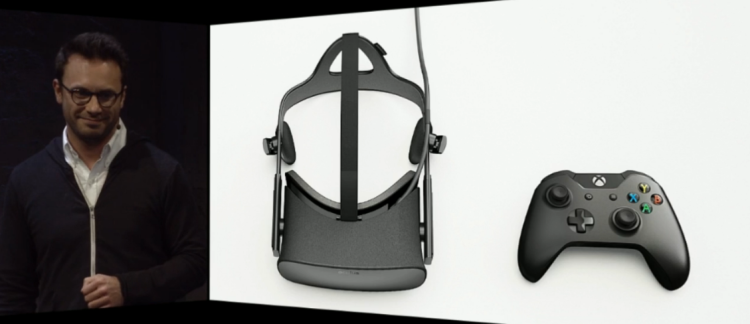One of the biggest surprises this morning from Oculus VR’s press briefing was its official alliance with Microsoft. The Oculus Rift virtual reality headset comes packaged with an Xbox One controller, and it will be able to stream Xbox One games.
At first glance, this looks like a huge win for Microsoft. It gets its controller and games associated with the biggest name in virtual reality — and social networks, once you take into account that Facebook, with a worldwide community of 1.4 billion active members, owns Oculus VR. (Microsoft has a 1.3 percent stake in Facebook.) But in reality, this is just a stopgap until both companies have their own content and hardware ecosystems in place.
The Rift isn’t going to be Microsoft’s main avenue to the future of gaming; its HoloLens project is that. HoloLens is an augmented reality device, not VR. And it represents what the Xbox maker is trying to do: develop its own way to stand out in what’s going to become a crowded virtual reality marketplace (with the Rift and Sony’s Project Morpheus being the leaders). For Microsoft, Rift is just a way to keep people interested in alternative forms of entertainment and games until its HoloLens is finished cooking.
The controller news is a stopgap as well. With the announcement of Oculus Touch motion controllers, it’s clear that the Facebook property needed to give people something to control their VR experiences with until its Wii Remote-like gadgets are ready. And since Xbox is already the preferred controller for PC gamers and developers, it’s no surprise that this is the solution it’s taking until the Touch is ready.
The same goes for Xbox-Rift game streaming. We already know that Windows 10 will stream Xbox games, so nothing’s groundbreaking there. And the Rift isn’t going to magically add virtual reality to a game that doesn’t have it. Instead, it’s going to be a “virtual cinema,” which isn’t true VR at all.
It’s just adding another device to the process here. I don’t see how this is going to entice anyone to buy a VR game on Xbox One over their PC. Why buy a game and stream it, needing three devices (PC, Rift, and game console), when you can cut out the Xbox? And what about latency, something that’s especially important for first-person shooter games or others that require precise control inputs? This is attractive just to the hardcore audience that really wants to play a game like Halo 5, an exclusive Microsoft game that won’t be on PCs but will be on Xbox, in this virtual-cinema setting.
Virtual reality is exciting. So is Microsoft partnering up with the biggest social network on the planet. But it’s really a marriage of convenience, one that reflects the need the Xbox company and Oculus have for content and devices until they have thriving ecosystems of their own.
VentureBeat's mission is to be a digital town square for technical decision-makers to gain knowledge about transformative enterprise technology and transact. Learn More

